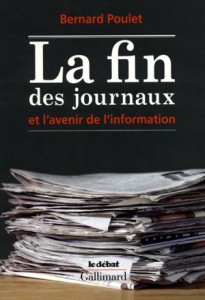
For some time, I’ve been meaning to promote Bernard Poulet‘s excellent La Fin des Journaux et l’avenir de l’information (The End of Newspapers and the Future of Information) to my francophone friends. It’s available from Amazon.fr in Europe and in North America from Amazon.ca, but not yet in an English-language version.
Poulet is editor in chief of the French business magazine l’Expansion, and his 217-page book caused a bit of a sensation even before it was published by Gallimard last year, when parts of it were excerpted in the magazine Le Debat.
France has seen the number of daily newspapers sold each day halve from 3.8 million in 1977 to 1.9 million in 2007 and national dailies such as Le Monde and Liberation totter on the verge of bankruptcy (despite French government subsidies to daily newspapers, ranging up to 15 percent of their gross revenues.) As in most other post-industrial countries, young people don’t regularly read newspapers anymore.
‘Maybe it’s time to panic’, is the title of Poulet’s first chapter. He sees multiple erosions of the traditional business model for publishing (and broadcasting) news:
The business has been based upon advertising being wrapped around the news, but now via the Internet advertisers have a more direct way to reach consumers.
Likewise, the consumers themselves are directly able via the Internet to consume the specific news they want more directly than purchasing entire packages of information (such as an entire newspaper or news magazine edition).
Plus, the ‘quality’ journalism model has lost touch with consumers and become so didactic that consumers reject and resent it.

Poulet says that journalists and publishers in France and other countries are in a psychological state of denial about these profound changes. Moreover, consumers are fleeing traditional journalists who are trying to exercise a moral authority over them and instead are seeking the ‘egalitarian ideology’ of the Internet, which gives them the ability to talk back to journalists, to talk to each other, and even to contribute their own stories via ‘citizen journalism’ and blogs.
He foresees the disappearance of daily newspapers in France in 20 to 30 years and the emergence of a two-tiered information system. There will be a wealth of deep and detailed information for the rich who can pay for it and there will be a superficial information for those who cannot pay or who don’t want to keep be kept informed.
If you can read French, I highly recommend this book. I hope an English-language version will be published. —Vin Crosbie
[Disclaimer: Poulet also is chairman of the Media Development Loan Fund, which helps finance and develop independent news outlets in countries with a history of media oppression. I’ve done unpaid, pro bono consulting to MDLF. I also am quoted in Poulet’s book.]